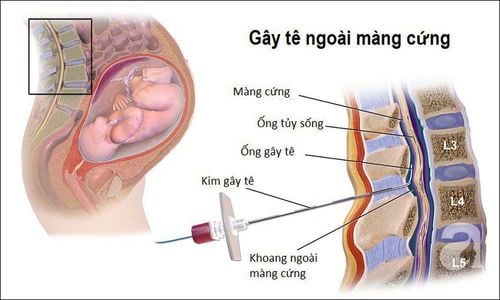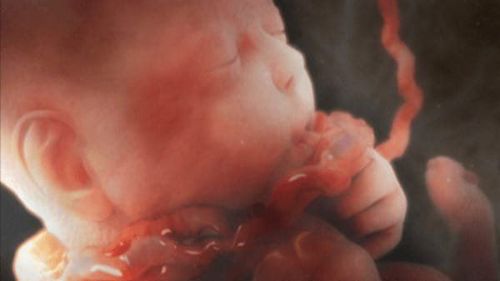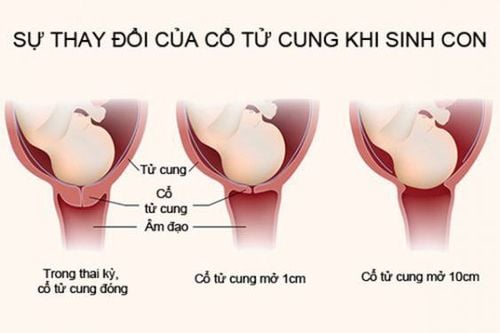This is an automatically translated article.
This article is professionally consulted by Doctor Nguyen Thi Man - Obstetrician and Gynecologist - Department of Obstetrics and Gynecology - Vinmec International General Hospital Da Nang.Fetal failure is a condition in which the fetus is deprived of oxygen during pregnancy or labor. There are two groups: acute pregnancy failure and chronic pregnancy failure. In particular, acute fetal distress refers to the phenomenon of fetal failure occurring suddenly, if not treated promptly, the fetus will have brain problems, even death. So, how much knowledge do mothers need about acute fetal distress?
1. Signs of acute fetal distress
1.1. Amniotic fluid color The amniotic fluid that comes out is blue, meaning meconium is present, this reflects the baby's lack of oxygen, pushing meconium into the amniotic cavity. Amniotic fluid discharge is bright red accompanied by constant abdominal cramps, sometimes it is a sign of placental abruption. 1.2. Fetal movement disorder The fetus will have abnormal movements, sometimes kicking hard and often, then slow down and no longer move after a while. This is a sign that the fetus is at risk of severe hypoxia, which can lead to fetal cardiac arrest.To recognize this sign, pregnant women should regularly monitor their pregnancy by counting their baby's movements regularly.
>>> Detailed instructions for counting fetal movements every day
With an abnormal fetal heartbeat, there are times when it is very slow, this sign will be checked most accurately when the pregnant mother goes to the doctor to be examined. Indications to measure fetal heart rate and uterine contractions on obstetrical monitors help detect early signs of fetal distress.

2. What are the common causes of acute fetal distress?
Causes of acute fetal distress include: From the mother's side, due to the fetus and the fetus's labor in labor.On the mother's side: Pregnant women with diseases such as anemia, heart failure, hypertension, hypotension, kidney failure, liver failure, respiratory failure, ...
Due to the fetus and its appendages: Underdeveloped fetus, malformations, prolapse of the placenta, knotted umbilical cord, placental abruption, preterm or premature pregnancy,...
During labor: Labor is prolonged, contractions are too strong, the uterus contracts hard.
Depending on the cause of the pregnancy failure, the doctor will have an appropriate treatment:
If there is a clear cause such as umbilical cord prolapse, placental abruption, threatened uterine rupture, ... the pregnant mother must have a caesarean section. pregnant now. If there is no obvious cause, the doctor usually puts the pregnant woman on the left side and breathes oxygen, the uterus does not press on the inferior vena cava, which can end the pregnancy failure. If fetal distress does not improve, an immediate cesarean section will be indicated.

3. To prevent acute fetal distress, how should pregnant women pay attention?
Pregnant women need to prepare the best knowledge, health and psychology to have a healthy and safe pregnancy. Pregnant women should have regular check-ups to detect fetal distress early and limit complications. Pregnant women need to:Cure chronic diseases before getting pregnant. Reduce all worries and troubles for women during pregnancy. Take the best care in nutrition, supplement protein, vitamins and trace elements, avoid high blood pressure, gestational diabetes,... Do not arbitrarily use drugs and stay away from cigarette smoke, Alcohol. Routine antenatal check-ups according to the doctor's appointment. When there are abnormal signs such as the fetus moving less, not moving, having uterine contractions, bleeding, vaginal discharge ... pregnant women need to see a doctor immediately. During labor, pregnant women need support and encouragement from relatives, to avoid letting the pregnant mother have negative effects on psychology, making the labor process prolonged, leading to a higher risk of fetal distress.

Acute fetal distress is a condition that deserves attention so that it can be handled promptly at the first sign. Therefore, understanding well and deeply understanding acute fetal distress will be one of the important keys to help mothers and babies have the best health and safe delivery.
Please dial HOTLINE for more information or register for an appointment HERE. Download MyVinmec app to make appointments faster and to manage your bookings easily.














